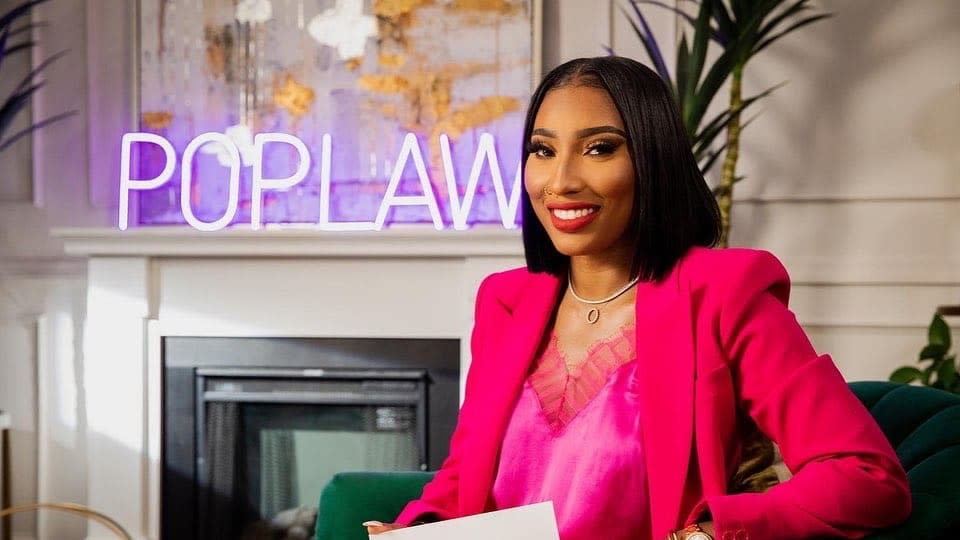Desiree L. Talley is on a mission to protect & empower the Black community by dissecting US law

- Oops!Something went wrong.Please try again later.
- Oops!Something went wrong.Please try again later.
- Oops!Something went wrong.Please try again later.
“POPLAW” is a forensic-level look into the inner-workings of the legal side of the entertainment industry. Hosted by Desiree L. Talley, every episode offers no-frills insight into the U.S. legal system as it relates to how we create and consume media, no matter the platform.
Talley showcases her range as a sharp-witted attorney who has her finger on the pulse of popular culture. Her deep understanding of show business – heavy on the business – proves valuable in her interviews with music producers, fashion designers, recording artists, and other entertainment workers.
Talley is a creative storyteller at heart, which stems from her early-childhood obsession with legal dramas and reality television. This fascination blossomed into a thriving law career, where she not only leads her own law firm, but also advocates for the education and empowerment of Black creatives.
Through “POPLAW,” Talley dissects the legal battles of your favorite celebrities and analyzes the latest headlines while keeping listeners engaged and informed. Get to know the woman behind the microphone in the exclusive conversation below. Plus, be sure tune in via the REVOLT Podcast Network.
When did you know that entertainment law was your passion?
Growing up, I loved music, television, magazines, and the law. Court TV was my thing. I used to race home from school, so I could watch Judge Judy, Judge Mathis, and Judge Joe Brown. I also loved the female attorney characters such as Claire Huxtable of “The Cosby Show,” Joan from “Girlfriends,” and Terri from Soul Food. One day, I came across an episode of “My Super Sweet Sixteen” that featured attorney Charles Mathis. From this episode, I learned what an entertainment attorney is, what they do, and how I can combine my passions for both law and entertainment.
Can you describe your approach to making complex legal matters more accessible for your listeners?
Through “POPLAW,” I am breaking down current legal disputes without the legal jargon, so listeners can understand how to navigate their own businesses and careers. For instance, “POPLAW” covered the dispute between GloRilla and Hitkidd about the “F.N.F.” song. We focused on the root of the problem, which was ownership of the record. We broke down both GloRilla and Hitkidd’s claims and provided tools that other musicians or producers can use to avoid ownership disputes before getting into the studio.
What is your mission and how has it shaped you throughout your career?
My mission is the protection, education, and advancement of Black culture. This mission has guided me in the jobs that I have taken, the clients that I have represented, and even the organizations and events that I affiliate myself with. Before I do anything, I ask myself, “Does this answer my personal why and my mission?”
What do you wish more people understood about the relationship between law and the entertainment world?
People should understand that law and entertainment are one and the same. Entertainment is a business. While there are agreements between companies and talent, company to company and more, there are also federal and state laws that govern how the entertainment world operates. It is important for people to have some understanding of how entertainment and law intersect because the images and music we consume impact our lives; we should know how these areas are regulated.
What has been your experience working as a Black woman in law?
My experience as a Black woman in the legal profession has been an interesting journey to independently navigate. From seasoned Black women attorneys shunning me because they considered me a threat to their own longevity, to white men threatening me for out-negotiating them, law has been a roller coaster journey and I am enjoying the ride. Overall, I am grateful for the opportunity to do work that I love and to educate others along the way.
When did you know it was time for you to chart your own path?
First, it was difficult for me to conform to the traditional standards of the role of an attorney and what an attorney looks like. I wear red lipstick, hoop earrings, change my hairstyle often and can switch from a tailored suit to a sweatsuit in an instant.
Second, I questioned the status quo of how deals were structured and always asked why provisions are drafted in a particular way. I also push for people who look like me to read the contracts and ask questions. Often, I was challenged on my thought process because my thoughts were considered “disruptive.” I knew that I was on to something and decided to navigate my career on my own terms.
What is your favorite kind of “POPLAW” episode to work on?
My favorite kind of “POPLAW” episodes to work on are episodes that provide tangible solutions to everyday scenarios for creatives. For example, in the episode “Black Girls Need Stylists Too,” my guest and I discussed the struggles that Black talent face on production sets when in hair and makeup, and the types of agreements that stylists enter. From this discussion, the “POPLAW” breakdown provided insight into service agreements and provisions that service providers (despite industry) should consider when negotiating agreements.
What do you want listeners to take away from each episode?
I want listeners to take away the feeling of being empowered and educated enough to confidently enter into a space or contract with the knowledge to navigate discussions and make decisions that are beneficial to them long-term.
Do you have any advice for people who aspire to take the entrepreneurial/creative route?
Know and understand your personal “why.” Why are you doing something? If you do not understand the why, nothing else makes sense.
Trending Stories

